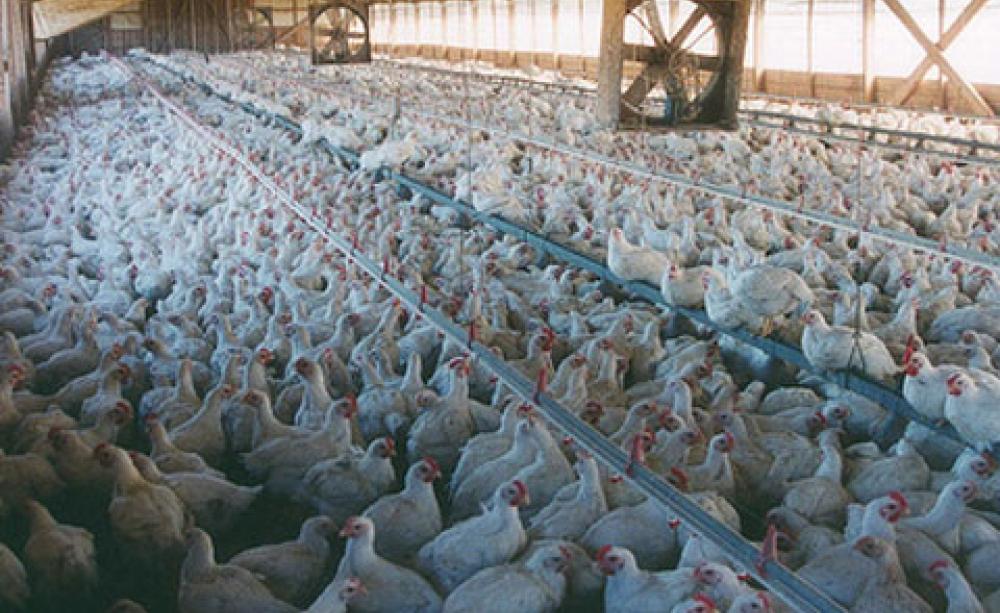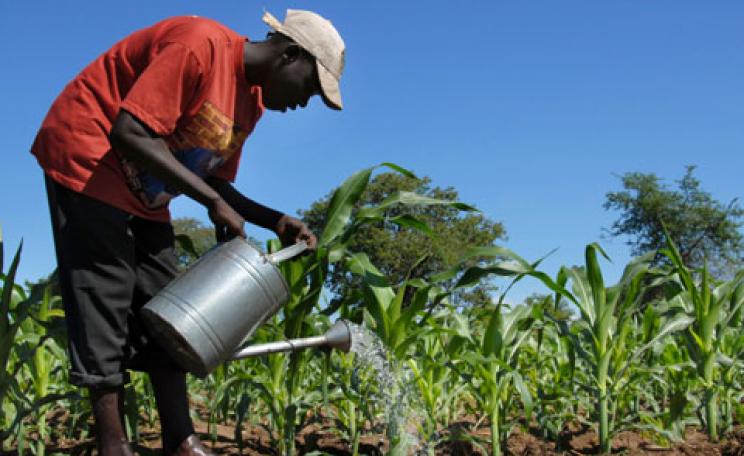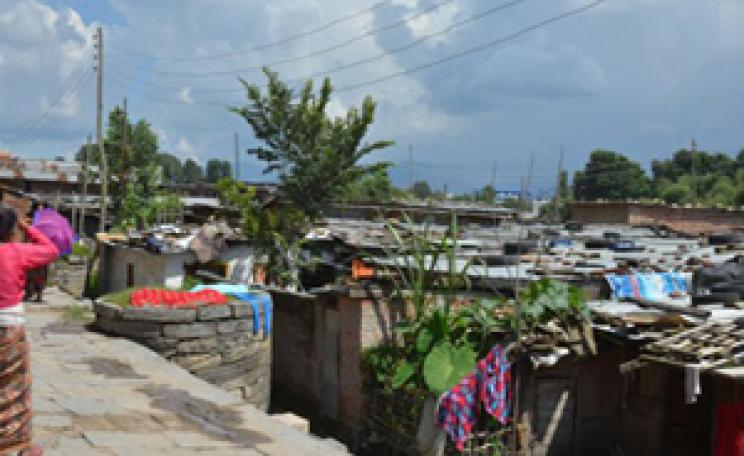Egyptians like their meat. They eat a lot of it. In order to maintain their daily, often multiple-times-per-day hunger for it, factory farming has entered the country. Often, these factory farms have been marketed to the population as 'organic', but their tactics, with closed walls and no sunlight, are part of the game of feeding the Arab world’s largest country.
The impacts from this growing industry have been felt by the population, and – in a now all too familiar cycle – as hunger grows, food prices continue to soar and the environment suffers from little to no regulation.
In April of 2009, anger at soaring meat-prices in the country boiled over, with two separate groups calling for a nationwide boycott of meat. The Egyptian Chamber of Tourist Establishments (ECTE) even called on all food outlets and companies to boycott red meat on 26th April.
‘Egyptians love their meat,’ café owner Waguih Samaan said at the time. He advocates purchasing from baladi – local farmers – in order to ‘not get involved with the factory farmers who are destroying too much of what it means to eat meat’. But it is proving ever harder.
Poor husbandry
One top ‘organic’ food production company in Egypt that specialises in rearing chicken refused the Ecologist a tour of its facilities, but a former employee was willing to discuss the situation inside the factory on condition of anonymity. He says his family would be in danger if his name were revealed.
‘Ahmed’, as he refers to himself, admits that the poor husbandry practices seen online and in investigative reports in the United States and Europe are ‘more common here in Egypt’. Ahmed says that when he was at the company ‘chickens were stepped on, kicked around and dealt with without any questions asked because we had to cram in as many chickens into the barn as possible to produce more and more meat for Egypt’.
According to the Central Bank of Egypt, some 2.2 million chickens are slaughtered daily as part of efforts to increase production. The only way of meeting these production needs is via factory farms. Ahmed says that he had no problem with how the animals were treated: ‘That’s what they are for.’
The greater problem, according to Algerian economist Jalil Barghouin, who is researching farming practices in Egypt, is not the treatment per se, ‘but how these new methods actually cost more for the average Egyptian on a daily basis’.
Growing costs
He cites a number of reports from Egypt’s Central Agency for Public Mobilization and Statistics over the past four years. What he has discerned is staggering. According to the numbers, the costs of meat – whether chicken or lamb, eggs, dairy and other animal products such as yoghurt – has risen a staggering 50 per cent for eggs and dairy, and almost doubled for meat products.
‘This is largely due to the rise of the factory farm in the country,’ he says. ‘It is because Egyptians want more meat that the price is rising, because even one decade ago meat-eating on a daily basis was not prominent in the country, but today many segments of society want their meat, and they want it quickly and easily. The result is the factory farm.’
According to Barghouin, factory farms run on the principle that they can keep meat cheap, and this ideology functions extremely well in the Western world, where the cost of meat has remained largely constant. But in the developing world it actually means price-hikes.
‘The cost of establishing and running a factory farm on a similar level in the developing world, from Egypt to Algeria, is massive. I have spoken to a number of individuals who say one piece of land to rear chickens costs in the US$300,000 range or higher,’ he reveals.
As a result, in order to keep chicken on the plate, companies such as those identified by the Ecologist above have been forced into factory farming. The result is higher prices to cover costs. ‘It’s a cycle that most Egyptians don’t understand and that is why you have anger and frustration.’
Increased consumption
A poll published earlier this year by the Information & Decision Support Center of the Egyptian Cabinet revealed that the consumption of red meat is increasing in dramatic fashion.
The study showed that only 11 per cent of Egypt’s 80-million-strong population eat less than 2kg of meat per month on average throughout the year. It gave stark statistics on meat consumption in the country, reporting that 32 per cent of the population consume an average of 2-4kg of meat per month, 30 per cent eat 4-6kg; 8 per cent consume 6-8kg; 6 per cent consume 8-10kg, while 7 per cent of Egypt eats more than 10kg of meat per month.
This desire to eat meat has led to the growth of the factory farm, but hunger in the country is still on the rise. In order to feed all the animals being prepared for slaughter across the country, acre after acre of arable land is being used for the production of feed that goes to sheep, chicken and the country's few dairy cows.
‘People here believe that meat is the only source for many nutrients and that vegetarian diets will make one malnourished and sick,’ says Salua Tarak, a Cairo-based dietitian for upper-class Egyptians and foreigners. ‘We know this is not the truth, but convincing people otherwise is hard.’
Unsustainable feed
The Egyptian ministry of agriculture told the Ecologist that nearly one-fifth of all farmland is currently being used for food for animals. At the same time the United Nations has warned that hunger in the country is increasing, with food shortages expected to hit the country in the coming few years, with what could be devastating effects.
Gian Pietro Bordignon, the World Food Programme (WFP) country director, says that Egypt must come to terms with the need to feed a growing population. Although he argues that meat-eating is vital to the health of the country, he does admit that ‘the government must see whether developing agricultural land is vital to animal production or could go better towards self-sufficiency’.
Barghouin says that it is difficult to combine sustainable efforts to combat hunger with the rise in industrial food farming. He points to the need to look hard at eating practices, and the belief that meat is a necessity, if Egypt is to overcome its burgeoning population issues and hunger.
‘If we look at how animals were reared, locally and in small farms or in backyards, this was more sustainable because it kept production minimal, costs lower and it was a catalyst toward environmental protection, but now we see that factory farms are doing all the things they do elsewhere and maybe even worse. It is not surprising to see hunger on the rise,’ he adds.
Lack of resources
Yussif Badr, an agriculture ministry official in charge of regulations in the northern Nile delta region, says that regulating companies on private land has proven difficult. He argues that in order to deal with the massive rise in industrial food production the ministry would need to double or triple the manpower that is already in place. This won’t happen, he admits.
‘We have a very small team and what we are forced to do is inform the companies when we are coming,’ he begins. ‘This means that cleaning up the area is being done before we arrive, so we rarely see any negligence or bad practices taking place.’
On top of this, he says that Egypt has no real enforced legal standard for food production. In his 12 years at the ministry, Badr admits he has seen animal carcasses thrown ‘one on top of another right next to irrigation that [is] being used for drinking water. I have also seen remains from chickens and waste thrown directly into the river system in the delta’.
He admits that it is an uphill battle, with millions of dollars spent annually by his department in an attempt to clean up the water systems for local villages, and a lack of power to do anything about it.
Dangerous impacts
According to Badr and others within the food industry, waste from factories and farms is continually tossed aside and left to rot close to where people live. This leaves both land and people in danger, according to environmental conservation consultant Richard Edwards, an American researcher at the US Department of Agriculture.
Walking through an abandoned farm, he points to what he terms ‘scorched earth’. It is a result of waste from animal production being thrown into ditches and left to decompose. While it does, for the most part, eventually do so, ‘the chemicals and drugs used to make the animals grow faster and larger has detrimental effects on the soil and surrounding crops’.
Edwards is not opposed to factory farming, but warns there must be a renewed sense of environmental protection if it is going to be sustainable. He argues that in countries such as Egypt, where government oversight is limited, ‘the companies must begin to see that their actions will not be helpful in the long run. If the land, water and other ecosystems cannot handle the levels of pollution, the land will die and along with it the ability to sustain animal-rearing in these conditions’.
In his research in Egypt, Edwards says that nearly 10 per cent of land used for animal production has made future farming ‘nearly impossible’. What is needed, experts argue, is a change of mindset across the country, one that provides for the population, is sustainable and that works with – not against – the environment.
| READ MORE... | |
 |
INVESTIGATION Fishy business The coastal towns and villages of Peru are being blighted by an industry that has sprung up to satisfy the West’s voracious appetite for fish – now marine life, human health and whole ecosystems are paying the price. The Ecologist Film Unit investigates |
 |
COMMENT Pig Business: behind the film they tried to ban Tracy Worcester’s ‘Pig Business’, a groundbreaking expose of US industrial pig farming conglomerate Smithfield Foods, has met with repeated attempts at censorship by the company’s lawyers. Here, she explains how England’s libel laws have helped stall the film’s general release, and stopped the world learning more about the environmental realities of intensive livestock rearing |
 |
COMMENT Organic farming has sold out and lost its way The dreams of the early organic pioneers have been subsumed into a rush for global supply chains, strict regulations and fast-selling brands |
 |
INTERVIEW Joyce D'Silva: 'Meat should carry a health warning' Eifion Rees talks to the Compassion in World Farming veteran and co-editor of The Meat Crisis - a shocking new book that exposes the range of environmental and health threats facing us if we don't kick our addiction to meat |
 |
VIDEO Sick as a pig Ever wondered if factory farming could kill you? Think again...It has plagued hospital wards in Britain for years, picking off the elderly and infirm. |








